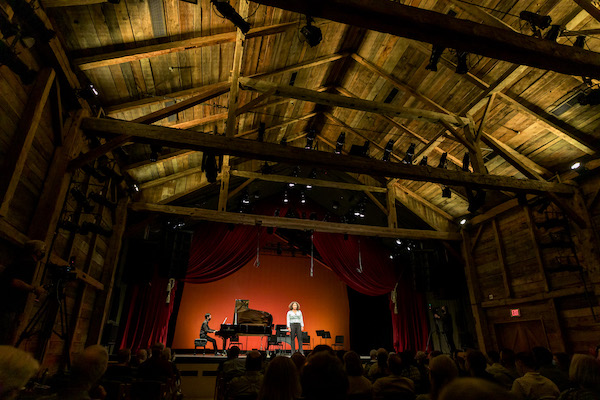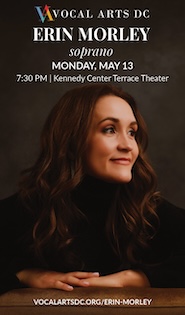UrbanArias, Wolf Trap commemorate the Tomb of the Unknowns with premiere of song cycle

Taylor Raven was one of the soloists at the world premiere of UNKNOWN presented by UrbanArias Tuesday night at Wolf Trap. Photo: Abe Landes
The weight of commemorating a significant anniversary often overburdens music created specifically for it. This was the potential danger of the lightning-speed commission of a new song cycle by UrbanArias, Wolf Trap, and other organizations, to mark the 100th anniversary of the Tomb of the Unknown Soldier. UNKNOWN, composed by Shawn Okpebholo on poems by Marcus Amaker, received its world premiere Tuesday evening in the Barns at Wolf Trap.
Robert Wood, founder of UrbanArias, described the genesis of the 20-minute work as “very fast by opera standards,” with the entire work conceived, written, edited, cast, and performed in about eight months. A filmed version, incorporating video and sound from this performance along with other footage shot in the area, will be released online next month.
The U.S. government dedicated the Tomb of the Unknown Soldier on November 11, 1921, as the final resting place of an unidentified service member killed in France during World War I. With the remains of other unknowns from later wars added in the intervening years, the tomb is guarded day and night and with immaculate precision by members of the 3rd U.S. Infantry Regiment, an elite unit known as “The Old Guard.”
It was a tall order to embody the symbolism of such a holy site in a brief work of music. Amaker’s poems offered a kaleidoscopic view, from the perspectives of today’s soldiers and military families, the honored dead, and the sentinels of the Old Guard. Okpebholo drew on a jazz-influenced instrumentation and harmonic idiom to create a contemporary, multicultural aura, with references to several forms of popular music. The filmed version will likely have a greater emotional impact.
Mezzo-soprano Taylor Raven, the ravishing Rosina in Wolf Trap Opera Company’s Barber of Seville in 2019, brought warmth and a robust chest voice to the first song. The alto saxophone of Noah Getz doubled her in bluesy clouds of harmony from pianist Wei-Han Wu and percussionist Eric Plewinski on vibraphone. The small instrumental ensemble, arrayed at the back of the Barns stage, was composed of members of Inscape Chamber Orchestra. Robert Wood conducted ably, although his coordination was likely not needed.
The powerful baritone of Michael Mayes evoked the anguish of family members waiting for the return of loved ones from war. Michael Rittling, on a pizzicato string bass line, and Plewinski, now on the claves, added an Afro-Cuban touch. The most challenging vocal part fell to baritone Schyler Vargas, who channeled his inner R&B singer to croon the third song’s forays into his falsetto range, echoed by misty saxophone and a halo of strings.
The fourth song repeatedly referred to the number 21, the number of steps taken by the sentinels at the tomb. Here the symbolism felt heavy-handed, with the snare drum even opening the song in the meter of 21/8, a quasi-military cadence giving way to something more like a tango. All three singers combined in this piece, at first in unison and then in harmonies, recalling the collaboration of the tomb guards.
In the final song the three singers brought back parts of their solo songs from earlier in the cycle. The snare drum returned at the end, suggesting the ongoing military engagement of American soldiers around the world. In the final bars a ringing open interval on the piano merged perfectly, if unintentionally, with a beeping cell phone alarm tone as the piece concluded.
A first half of songs on related subjects extended the program into a more complete evening. Raven’s exquisite range and coffee-rich tone was heard in two excellent songs by Harry T. Burleigh, “I Want to Die While You Love Me” and “The Sailor’s Wife.” It was laudable that these were not Burleigh’s perhaps better-known spiritual arrangements, but original songs setting poetry about the erotic angish for absent partners.
Vargas distinguished himself with a composed, silken rendition of “Tom Sails Away” by Charles Ives, a WWI-era song complete with allusions to the tune of George M. Cohan’s “Over There.” Vargas’s take on “When the Boys Come Home,” by Oley Speaks, crossed into the realm of patriotic kitsch, and the top range pushed his voice to the edge of comfort.
Mayes scooped to high notes in his enthusiastic crooning of Irving Berlin’s “What’ll I Do?,” complete with a pleasing, jazzy accompaniment by Wei-Han Wu, who accompanied the first half on the piano. Yet it was Mayes who stole the show in this first half, his broad range and vocal power overwhelming in Lee Hoiby’s “Last Letter Home.” The text, a letter written by a soldier in Iraq and only read because he was killed, was clear and devastating in Mayes’ impeccable diction.
The digital film of UNKNOWN will be released on November 11. urbanarias.org



